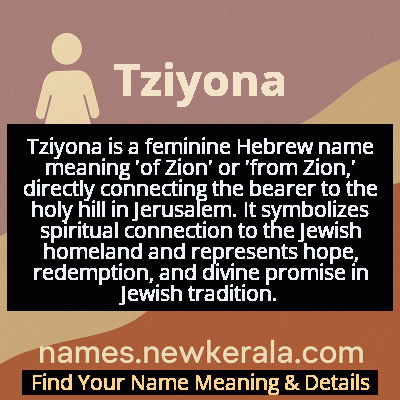Tziyona Name Meaning & Details
Origin, Popularity, Numerology Analysis & Name Meaning of Tziyona
Discover the origin, meaning, and cultural significance of the name TZIYONA. Delve into its historical roots and explore the lasting impact it has had on communities and traditions.
Name
Tziyona
Gender
Female
Origin
Hebrew
Lucky Number
2
Meaning of the Name - Tziyona
Tziyona is a feminine Hebrew name meaning 'of Zion' or 'from Zion,' directly connecting the bearer to the holy hill in Jerusalem. It symbolizes spiritual connection to the Jewish homeland and represents hope, redemption, and divine promise in Jewish tradition.
Tziyona - Complete Numerology Analysis
Your Numerology Number
Based on Pythagorean Numerology System
Ruling Planet
Moon
Positive Nature
Diplomatic, friendly, artistic, empathetic.
Negative Traits
Over-sensitive, moody, indecisive, prone to self-pity.
Lucky Colours
Green, cream, white.
Lucky Days
Monday.
Lucky Stones
Pearl, moonstone.
Harmony Numbers
1, 3, 4.
Best Suited Professions
Diplomats, mediators, caregivers, artists.
What People Like About You
Cooperative spirit, friendliness, artistic talent.
Famous People Named Tziyona
Tziyona Koenig
Israeli educator and community leader
Founded educational programs for underprivileged youth in Jerusalem and promoted cultural preservation
Tziyona Barzilai
Israeli poet and writer
Published multiple collections exploring Jewish identity and spiritual connection to Zion
Tziyona Raz
Israeli musician and composer
Composed liturgical music that integrated traditional Jewish melodies with contemporary arrangements
Name Variations & International Equivalents
Click on blue names to explore their detailed meanings. Gray names with will be available soon.
Cultural & Historical Significance
In modern Israeli society, the name gained particular resonance during the early Zionist movement and after the establishment of the State of Israel in 1948. It represents the realization of ancient prophecies and the living connection between the Jewish people and their ancestral land. The name is often chosen by families with strong Zionist convictions or those celebrating their connection to Jerusalem, serving as a living testament to Jewish continuity and national revival.
The name also reflects the feminine aspect of Jewish national identity, complementing masculine forms like Tzion. This gendered distinction highlights the nurturing, protective qualities associated with the homeland while maintaining the name's powerful historical and spiritual connotations. Tziyona thus serves as both a personal identifier and a cultural statement, connecting individual identity with collective Jewish destiny.
Extended Personality Analysis
Women named Tziyona are often perceived as deeply spiritual, grounded individuals with strong connections to their heritage and community. They typically exhibit a natural leadership quality combined with compassionate understanding, making them effective in roles that require both strength and empathy. Their connection to the name's historical significance often translates into a sense of purpose and dedication to causes larger than themselves. These individuals tend to be resilient and determined, reflecting the enduring nature of Zion itself.
In interpersonal relationships, Tziyonas are known for their loyalty and steadfastness. They often serve as pillars within their families and communities, providing stability and wisdom during challenging times. Their spiritual depth frequently manifests as intuitive understanding and the ability to see beyond surface appearances. While they respect tradition, they also demonstrate adaptability, successfully integrating ancient values with modern realities.
The name's connection to Jerusalem's highest point often correlates with ambitious yet grounded personalities. Tziyonas typically approach life with both vision and practicality, setting high goals while maintaining the perseverance to achieve them. Their combination of spiritual sensitivity and practical capability makes them effective in bridging different worlds and bringing people together around shared values and common purposes.
Modern Usage & Popularity
Tziyona maintains a steady though selective presence in contemporary naming practices, primarily within Israeli and Jewish diaspora communities. The name experienced notable usage peaks during significant historical moments for Israel, particularly around the Six-Day War in 1967 when access to Jerusalem's Old City was restored. While it never reached the popularity of more common biblical names, it remains a meaningful choice for families emphasizing Zionist values or Jerusalem connections. In recent decades, the name has seen a modest revival among younger parents seeking traditional Hebrew names with deep cultural resonance, often as part of a broader trend toward reclaiming authentic Jewish names. Its usage is particularly concentrated in religious Zionist communities and among families with personal or historical ties to Jerusalem, where it serves as both a personal identifier and a statement of cultural continuity.
Symbolic & Spiritual Meanings
Tziyona carries rich symbolic meanings that extend beyond its literal translation. The name represents the concept of spiritual elevation and divine connection, mirroring Zion's physical elevation above Jerusalem. It symbolizes the eternal bond between the Jewish people and their homeland, embodying themes of return, redemption, and national fulfillment. The name also carries connotations of foundation and permanence, reflecting Zion's role as the bedrock of Jewish faith and identity throughout centuries of dispersion.
Metaphorically, Tziyona represents the feminine aspect of national consciousness—the nurturing, protective qualities associated with homeland and heritage. It evokes images of light and guidance, serving as a beacon of hope and spiritual direction. The name also symbolizes cultural resilience and the ability to maintain identity through changing circumstances, much like the enduring presence of Zion itself through millennia of history. These layered meanings make Tziyona not just a personal name but a vessel carrying profound cultural and spiritual significance.

